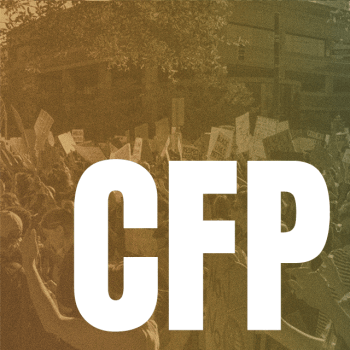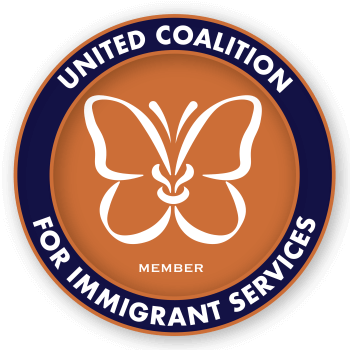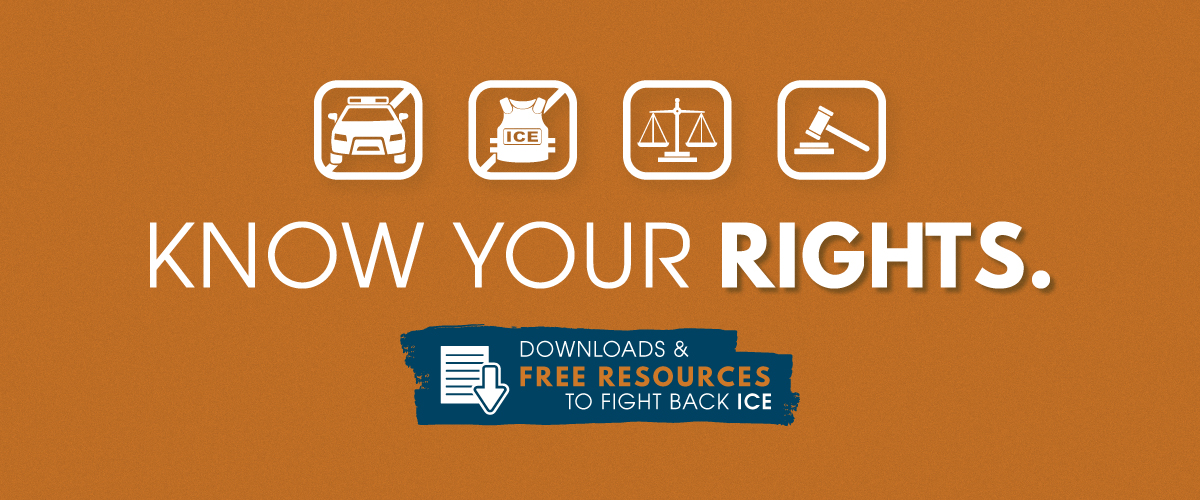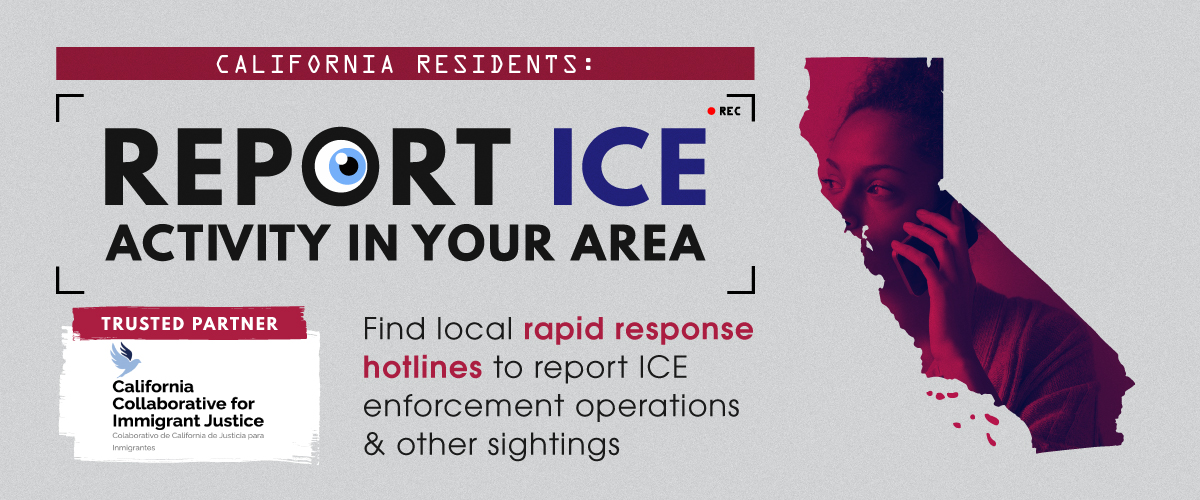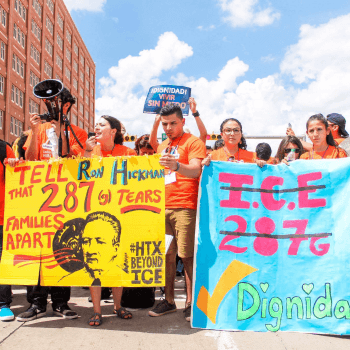
Local Policy Interventions for Protecting Immigrants
Projects and Networks
Immigrant Justice Network
New Americans Campaign
Collective Freedom Project
United Coalition for Immigrant Services
State Map on Immigration Enforcement
The Department of Homeland Security detains and deports hundreds of thousands of immigrants every year. The massive immigration enforcement regime has devastating effects on immigrant families and communities. The Immigrant Legal Resource Center (ILRC) has been at the forefront of campaigns locally and nationally to fight back against immigration enforcement and protect immigrant rights.
The ILRC provides resources and support to communities and organizations working on immigration enforcement issues, including background explanations, strategy tools for campaigns, legal and policy analyses, and ongoing assistance to campaigns fighting against unfair immigration enforcement.
ILRC Resources on 287(g)
National Map of Local Entanglement with ICE
As a national expert, the Immigrant Legal Resource Center (ILRC) provides technical assistance, trainings and practice manuals on critical immigration options for vulnerable immigrants including immigrant victims of domestic violence, human trafficking and other crimes.
U Visa: Immigration Relief for Survivors of Domestic Violence and Other Crimes
Immigrant victims of certain crimes who have been helpful in a criminal investigation or prosecution may qualify for a visa that can lead to a green card. The ILRC’s practice manual entitled The U Visa: Obtaining Status for Immigrant Victims of Crime is a comprehensive explanation of the law and application process that also includes sample materials and practice tips.
VAWA: Immigration Relief for Survivors of Domestic Violence and Other Crimes
VAWA allows an abused spouse or child of a U.S. Citizen or Lawful Permanent Resident or an abused parent of a U.S. Citizen to self-petition for lawful status in the United States, receive employment authorization, and access public benefits. VAWA provides domestic violence survivors with the means that are essential to escaping violence and establishing safe, independent lives. ILRC has co-authored The VAWA Manual, a step-by-step guide to assist advocates working on VAWA cases.
T Visa: Immigration Relief for Survivors of Sex or Labor Trafficking
Human trafficking survivors may be eligible for lawful status, employment authorization, and a potential path to permanent residency, but they are a unique population with diverse and resource-intensive needs. The ILRC publishes a guide, Representing Survivors of Human Trafficking, on special considerations when working with human trafficking victims.
Use of the Term “Victim” vs. “Survivor”
Please note that the ILRC often uses the terms “victim” and “survivor” interchangeably. Because a “victim” is typically defined by harm done to them, many advocates choose to instead use the word “survivor” to refer to clients. “Survivors” are defined by their lives after the harm, allowing them to reclaim control of their lives and their recovery. While our goal as advocates is to help community members survive and thrive despite harms they have suffered, we sometimes use the term “victim” when referring to a particular aspect of the criminal legal system, penal code, or immigration law; when describing someone recently affected by crime; when talking about the actions of a perpetrator; or when discussing the harm inflicted on those who did not survive. When working with impacted community members, we recommend asking people which term they prefer, as some may identify with the term victim, while others may prefer the term survivor.
The Immigrant Legal Resource Center (ILRC) builds a democratic society that values diversity and the rights of all people. Through ILRC’s policy and advocacy efforts, we promote a vision of racial justice that advances the rights of all immigrants, including those who have had contact with the criminal legal system.
ILRC engages in policy and advocacy throughout the United States with a particular focus on local policy work in Texas, local and state policy work in California, and policy advocacy at the federal level. Our policy and advocacy efforts are guided by three main pillars: 1) dismantling the arrest to deportation pipeline and disrupting racial disparities in the immigration and criminal legal systems; 2) expanding immigration law to improve protections from deportation and access to immigration relief; and 3) preserving and expanding access to legal services and opportunities for citizens and non-citizens to engage in the political process.
Our Community Resources page is a prime embodiment of our commitment to bringing clarity to complicated immigration issues. Resources on this page include a wide range of downloadable tools produced for diverse audiences, from experienced advocates to directly impacted community members seeking answers about the complex world of immigration law.
If you are seeking legal support for your case:
The Immigrant Legal Resource Center’s main focus is to educate and assist attorneys and legal advocates in their work to help immigrants and their families. For over 40 years, we have impacted the field of immigration law with a three-pronged approach – capacity building, policy advocacy, and civic engagement. Because this work is generally focused around teaching, interpreting, and changing law to empower legal practitioners, we do not directly represent clients at the ILRC, nor do we provide individual legal consultations. If you are seeking legal advice or representation in your case, we encourage you to visit the Immigration Advocates Network’s National Immigration Legal Services Directory below to find a trusted legal service provider in your area. You can also go to LawHelpCA.org to find connections to legal aid organizations and referral services.
Commitment to Dismantling Anti-Blackness and Racism
George Floyd, Ahmaud Arbery, Breonna Taylor, Rayshard Brooks, Tony McDade, Riah Milton, Dominique Fells. These are more than names, more than hashtags—they represent a life cut short, a family’s grief, a community’s despair and outrage. The slaying of Black community members by the police, targeting of Black people and communities of color, and racist rhetoric by Trump and his followers are continual reminders that anti-Blackness and racism pervade our society and imperil ILRC’s mission to promote diversity and uphold the rights of all people.
As an immigrant rights organization, it is our responsibility to recognize that our fight for justice is inextricably linked to the efforts of Black, Indigenous, and other people of color. We stand in solidarity with the Black community and the bold demands of Black organizers and Black-led organizations who are leading the work to end police brutality, anti-Blackness, and racism.
As an organization, we also recognize that we can do more to address and dismantle systemic racism, both internally and externally. As first steps, we commit to:
- Continuous learning by staff and board to develop and maintain a shared understanding of what racial justice is and how to actively practice anti-racism
- Conducting an equity, diversity, and inclusion audit of all aspects of our organization—including our board, leadership, staff, and partners—and developing an action plan on increasing racial equity based on this audit
- Exploring and implementing policies, practices, attitudes, and actions that produce more equitable power, opportunities, and outcomes for Black people and people of color inside our organization and in our work with partners
- Providing opportunities for interested staff to engage and contribute to these ideas
- Standing in solidarity with, learning from, and supporting Black community members and allies across the country who are bravely protesting the system of white supremacy that perpetuates the devaluation of Black lives in this country
- Calling for and working towards solutions that dismantle racist institutions and direct our local, state, and federal resources towards our communities in a way that ensures that Black community members can live safely and thrive
Using an Abolition Framework to Guide our Work
INTRODUCTION: At the ILRC, we are committed to racial justice, centering individuals directly impacted by the criminal and immigration systems, and defining the justice we seek. We are learning to articulate the philosophical frameworks that undergird and unify our work, determine how we prioritize the issues to which we devote capacity, help us evaluate our effectiveness, and remain accountable to the communities we serve. Through these processes, we have thought deeply about how abolition impacts our work.
WHAT IS ABOLITION? Abolition is the belief and political vision that policing, imprisonment, and surveillance cannot be reformed to become more just or effective; but rather, these systems should eventually shrink into non-existence. The idea is that building safe and healthy communities does not depend on prisons and punishment. Instead, we should work through other means to ensure that all community members have their basic needs met. Abolition is a broad strategy. An abolitionist vision means that we must build models today that represent how we want to live in the future. It means developing practical strategies for taking steps toward making real our vision of healthy and thriving communities and living this vision in our daily lives. Abolition focuses on change that reduces, rather than strengthens, the scale and scope of policing, imprisonment, detention, deportation, and surveillance and investing instead into systems and strategies that lead to communities where all people are welcome. The vision recognizes that transformative change can occur through both incremental and bold steps.
ILRC’s WORK: We acknowledge that we are not an abolitionist organization, as we often work within certain established systems. We do, however, apply abolitionist values, practices, and ideals to help us think through and make important decisions about how we do our work. For years we have worked through an abolitionist, racial justice, and economic justice lens, especially in the deportation, detention, crimmigration and enforcement spheres of our work. For example, over the last couple decades, our work has included the following efforts to dismantle and/or curtail immigration enforcement, surveillance, and detention systems:
- Advocating to pass laws to stop cooperation between local law enforcement and other local officials and ICE;
- Advocating to decriminalize offenses and create mechanisms to avoid arrests and convictions;
- Advocating to discourage opening new immigration detention facilities and decrease spending on detention bed space; and
- Distributing millions of Red Cards (Know Your Rights Cards) to immigrants to frustrate ICE’s ability to arrest immigrants.
THE FRAMEWORK AND HOW TO USE IT: We use an abolitionist framework to guide some of our work. The ILRC uses a series of guiding questions to encourage us to examine our internal practices and external partnerships and to explore whether they support or hinder abolitionism. These guiding questions are applied broadly in our decision-making including in our policy positions, in engaging partners and choosing services, in addressing interpersonal conflict or violence, in fundraising and grantmaking, and in sharing and promoting our resources and technical assistance. Adopting this framework will help us develop the practice and discipline required to become an organization informed by abolitionist principles.
GUIDING QUESTIONS: Our guiding questions are not meant to be prescriptive. Instead, they are meant to help staff articulate why and how we make decisions and to consider how a decision aligns with an abolitionist framework. They are meant to encourage staff to consider the implications of their actions, articulate how and why they are choosing to make certain decisions, and gain deeper insights into their work.
- What is the issue? What is the goal of participating in the activity?
- What is the vision for this work?
- What are we trying to build?
- Who are we trying to support?
- Does this work or decision expand the reach of law enforcement and/or immigration enforcement?
- Are we empowering actors in the immigration enforcement and/or criminal legal systems, or are we taking power away?
- Are we directly or indirectly supporting funding that advances law enforcement and/or immigration enforcement?
- Are we overtly or implicitly promoting policing? Detention? Surveillance? Incarceration?
- Does this work challenge the notion that policing increases safety? Does it reduce tools law enforcement have at their disposal or reduce the scale of policing?
- How does the work or decision center directly impacted communities throughout the process?
- Does the activity invest power and resources in directly impacted communities?
- Is there a plan to consult directly impacted communities on the strategies and messaging on an ongoing basis? How will the project compensate them for their time, work, and expertise?
- How will we engage and consult with others working on related issues within and outside of the ILRC in a manner that is consistent with our values?
- How does this decision affect our relationship with community partners?
- How are we being genuinely inclusive through our actions and messaging?
- How might we reclaim what public safety means and looks like?
- Is the humanity of one group privileged over others? Is the messaging around decarceration of some based on the incarceration of others?
- How might we integrate language about abolition into the overall messaging?
- What is the decision-maker/group’s process to regularly check in on alignment with abolitionist values and goals?
- What is the decision and how was this decision reached? What outcomes are we hoping to achieve? How do these outcomes fit within our larger goals?
ENGAGING STAFF IN THE PROCESS: For this framework to be successful, we ask that all members of the ILRC engage in this process, commit to consider the guiding questions, and be open to discussing questions that emerge. We realize that staff may have different perspectives on the best approach to take on a given project and surfacing those tensions in a productive way is an integral part of learning how to apply this framework. The presence of disagreement does not always signal a lack of commitment to abolitionist principles. Often, disagreements may be rooted in differing perspectives about whether to employ strategies focused on incremental change or bold transformative change. As mentioned above, working towards an abolitionist vision does not necessarily mean that incremental and transformative change are distinct from one another. Rather, abolition creates space for reforms that reduce the scope of policing, imprisonment, and surveillance and increase community safety and health. Complete agreement on how to move forward may not be possible given the complex factors at play with these types of discussions. We encourage staff to think about opportunities to incorporate an abolitionist vision and practices in their work at the ILRC and engage in discussions with colleagues when uncertainty arises.
BACKGROUND READINGS:
- What is Abolition?
- Reformist Reforms v. Abolitionist Steps in Policing
- Amnesty or Abolition?
- How Can We Reconcile Prison Abolition With #MeToo?
- Abriendo Corazones- Abolitionist Resources
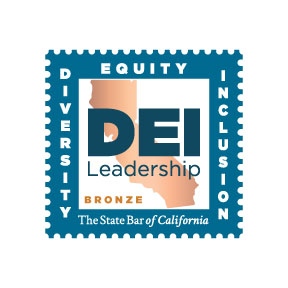
Employment Opportunities
The ILRC Is an Equal Opportunity Employer
The ILRC is an equal opportunity employer and encourages women, people of color, persons with disabilities, and lesbian, gay, bisexual, and transgender individuals to apply. The ILRC abides by the SF Fair Chance Ordinance.
Law Clerk Opportunities
Position Description: Law clerks will be assigned to a variety of projects and supervised by an ILRC attorney. Assignments span the ILRC's diverse project areas including policy, legal trainings, and immigrant civic engagement. For example, last year’s intern projects included, research and writing for ILRC’s practice advisories and manuals widely used by immigration practitioners; community engagement and community presentations; and work on implementing laws authored and co-sponsored by the ILRC. Each clerk is assigned an ILRC mentor attorney and the summer program includes immigration law trainings created especially for our law clerks.
Qualifications: Applicants with strong legal research and writing skills and a demonstrated commitment to immigration issues are encouraged to apply. A ten-week commitment is preferable and fluency in other languages is a plus. For further details on our summer clerkship program, see the posting above.
Law students are accepted for the spring and fall semesters and during the summer. We generally accept summer law student applications from January through February.
We accept law student applications to work during other times of the year on an ongoing basis. During the spring and fall semesters we ask that law students commit to a minimum of 12 hours per week for the entire semester.
For law student internship requests, we ask that you use the “Summer 2020 Law Program” link above to submit an application.
Legal Volunteer Opportunities
With a small and specialized staff, ILRC is active on the regional, state, and national fronts of immigration law and policy. To maximize our staff resources, ILRC often calls upon volunteers to contribute to our mission.
Because the majority of our work requires legal skills, we generally do not accept undergraduate student volunteers. However, volunteers who are fluent in other languages such as Spanish, Cantonese, or Mandarin may be needed on an occasional basis for translation. From time to time, we also appreciate the contributions of volunteers who are interested in development work.
We accept volunteer immigration attorneys on an ongoing basis. For attorneys who are interested in volunteering with the ILRC, we ask that you submit a cover letter explaining your interest and qualifications, a resume of academic and work experience, and a brief writing sample.
Please get involved today. Your help really makes a difference. To find out about volunteer opportunities and how you can join our efforts, please contact Sharon Hing, shing@ilrc.org, Legal Program Collaboration Manager. Please use the subject line “Legal Volunteer Inquiry.”
The ILRC does not provide direct legal services or individual legal consultations. To find legal services assistance, go to: Immigration Advocates Network National Immigration Legal Services Directory, American Immigration Lawyers Association Immigration Lawyer Search, or contact your local state bar association.
You can find community resources here.
If you’re looking for information about our Red Cards, including artwork you can customize for your own organization, see here. Please note that we no longer fulfill requests for cards through email.
If you have a question about our Attorney of the Day service, you can find more information here.
If you are interested in purchasing our Publications or Trainings, please see here. A reprint permissions form can be found here.
Today we are facing a global health crisis that has disrupted communities and lives around the world. In the United States, the emergency of COVID 19 has brought into sharp relief the need for broad systemic change of the immigration and criminal systems that underlies the Immigrant Legal Resource Centers (ILRC's) mission and policy and advocacy work.
Urgent action is needed at the local, state, and federal levels to mitigate the reach of this pandemic virus. As with most aspects of everyday life, coronavirus impacts every area of our work including disrupting naturalization processes, highlighting the medical neglect in detention facilities, emphasizing the inherent dangers of ICE enforcement activities, exposing the public health concerns in jails and prisons, and demonstrating how immigrants are discouraged from accessing medically necessary treatment. Most disturbing, the administration has weaponized this global health crisis to further damage the immigration system and harm immigrants and their families by actions such as stopping all visa processing from abroad, including issuance of green cards; and closing down our borders and effectively prohibiting people from applying from asylum.
The purpose of this web page is to provide information and resources on how COVID-19 is affecting immigrant communities. In some instances, we issue recommendations for how the government should react to protect immigrant community members and share the recommendations our partners from the immigrant, criminal justice, and health care advocacy sectors. The ILRC will continue to do everything we can to protect and defend the rights of immigrants.
Note: The issues we highlight below are constantly evolving. This page will be updated on a periodic basis as issues related to COVID-19 and immigration continue to rapidly develop. (Last updated: March 25, 2020)
Table of Contents
- Immigration Enforcement
- Criminal and Immigrant Justice
- Immigrant Detention
- Immigrant Youth
- Immigration Proceedings
- Public Charge
- Naturalization
- Census
- Immigrant Community Safeguards
Immigration Enforcement
Ongoing immigration enforcement will only increase the number of people exposed to COVID-19. The federal government officials who enforce federal immigration laws have demonstrated indifference to the lives, safety, and health of immigrants. On the ground, Immigration and Customs Enforcement (ICE) has continued its daily enforcement operations to make arrests throughout the country. Although ICE has stated that they are limiting their arrests to those who are not "public safety risks" (according to their own assessment) and individuals subject to mandatory detention, this response falls dangerously short of what is required during this global health emergency. There have been numerous accounts of ICE agents continuing to arrest immigrants during the pandemic.
Federal
Federal immigration agents must immediately suspend all enforcement activities across the US, including but not limited to: cancelling all check-in appointments; not entering local and state criminal jails and prisons to collect information on or arrest individuals; not participating in joint task forces; halting the 287(g) program, which deputizes local law enforcement with certain immigration enforcement powers; community enforcement including but not limited to courthouse arrests and arrests in people's homes, and suspending all deportations. That an agency notorious for disregarding public health should not be allowed to use local criminal systems as a force multiplier for how many people it ensnares is starkly apparent during an international health crisis.
ICE and CBP should not receive additional federal funds to expand detention operations. The CDC guidelines recommend social distancing to limit COVID-19 exposure. ICE and CBP continue to arrest and detain immigrants without any access to appropriate sanitation and precautionary measures to prevent the spread of the virus. Any money allocated to the Department of Homeland Security for pandemic response should be restricted so it cannot be transferred for the expansion of enforcement actions, detention, or construction of the border wall. For more information on detention, click here.
State and Local
State and local officials must immediately disentangle their agencies from federal immigration enforcement.
State officials: State and local officials who control jails, prisons, probation departments, and courts, and who determine whether to facilitate ICE arrests at these facilities, must exercise all available legal discretion to stop cooperating with ICE on these efforts immediately. Many states, counties, and cities have implemented sanctuary laws and ordinances that authorize public employees and government agencies to refuse to help ICE arrest immigrant community members. Where there are gaps, these policies should be strengthened, and all other localities should aim to adopt the strongest version of these policies, especially during this health crisis.
Communities should continue campaigns to ensure state attorneys general, local boards of supervisors, and county sheriffs do not use local resources to help ICE.
Local law enforcement (sheriffs and police): Local and state law enforcement must disentangle themselves from federal immigration enforcement. This disentanglement includes, but is not limited to, ending : 287(g) agreements; allowing ICE in the jail for any purpose including ICE arrests, information-sharing, or ICE interviews; information-sharing with ICE, including a person's release date, access to databases, booking information or any other local information; supporting ICE raids; and joint task forces. Sheriffs and other law enforcement agencies should not honor any ICE detainers or hold individuals in custody to facilitate transfers to ICE custody.
States with anti-immigrant policies: In states where anti-immigrant, anti-sanctuary state laws are in place, the Attorney General should suspend any provisions of those laws related to ICE detainer mandates and use of local resources for federal immigration enforcement activities, including the suspension of all sanctions and penalties against law enforcement agencies who do not comply with ICE detainer requests. The Governor should cease transfers from state custody to ICE custody.
Groups like the Immigrant Justice Network and United We Dream have written statements and begun called for the suspension of all ICE activities.
Additional Resources
- Jails Are Worsening the COVID-19 Pandemic by Transferring People to ICE
- Immigrant Justice Network statement on ICE's "change in enforcement"
- United We Dream petition to suspend ALL enforcement activities and operations
- Meeting with Law Enforcement in Light of California's Sanctuary Law
- Growing the Resistance to Understand How Sanctuary Policies Work and What Jurisdictions Have Them Throughout the Country
- National Map of Sanctuary Policies Throughout the Country
- Ending 287(g): A Toolkit for Local Organizers
Criminal and Immigrant Justice
Immigrants and citizens suffer from being locked in jails and prisons. We join our partners from the criminal justice advocacy community to demand critical interventions that will ensure incarcerated community members are protected from the reach of COVID-19.
Federal
We urge federal law makers to pass A New Way Forward which rolls back harmful immigration laws that, for decades, have led to racial profiling and disproportionately resulted in the incarceration, deportation, and destruction of families of color and immigrant communities. Now, more than ever, we need to advance bold new initiatives that protect our communities from over policing and over prosecution. We join Federal Defenders in calling on AG Barr to reduce pre-trial detention and expand all opportunities for early release. We join our partners in urging the end to the criminalization of migration, including ending prosecutions under 8 U.S.C. 1325 and 1326 and ending Operation Streamline.
State
Governors should consider acts of clemency, including commutations and pardons. Public health experts and local, state, and federal officials have made clear that people are not safe where they are housed in large numbers. Law makers should give effect to laws authorizing the release of people from jail or prison "when a pestilence or contagious disease breaks out in or near." See, e.g., Cal. Penal Code s. 4012, Ariz. Rev. Stat. Ann. S. 31-106, N.Y. Correct. Laws. 141, Miss. Code Ann. S. 47-3-7, Colo. Rev. Stat. Ann. S. 13-45-111.
Local
At the local level, law enforcement must limit contacts, stops, and warrant enforcement that could contribute to later incarceration.
Sheriffs. Sheriffs should eliminate all pre-trial incarceration, decrease daily bookings and move promptly to release people from jail. We have already seen sheriffs, from Mississippi to California, release people from jails in response to the public health crisis. Sheriffs must request the mass release of incarcerated people and stop engaging in pre-trial custodial detention. For example, in Mahoning County, Ohio, which includes Youngstown, the Sheriff's office has refused to book all nonviolent, misdemeanor arrests at the county jail and is telling officers to issue summonses instead.
Police. Police should increase access to pre-arrest diversion and decrease incidents of booking by expanding cite and release measures. In Los Angeles, in one weekend alone, police reduced arrests from 300 to 60. In Bexar County, Texas, where San Antonio is located, the county has suspended arrests for minor offenses for 30 days. Local law enforcement should minimize instances of taking people into custody and expand access to pre-arrest and cite and release programs.
Prosecutors. Prosecutors should decline criminal charges whenever possible and divert to public health and community-based solutions. Groups of prosecutors have signed on to a letter calling for changing charging practices in light of the pandemic. For charges not declined, prosecutors should reduce as many as possible to citations or non-warrant, non-arrest charges, and make return date 6 months out. Prosecutors should agree to the release of people from custody without bail or in-person check-in with pretrial services. Prosecutors should default to noncustodial sentences wherever possible, avoid pleas that expose noncitizens to subsequent immigration detention where outbreak potential is highest, and reduce the number of in-person appearances in court to resolve a matter. Prosecutors should also actively support efforts for early release from criminal custody as well as record clearance efforts that eliminate the on-going immigration, employment, and housing consequences of criminal convictions.
Additional Resources
- The Justice Collaborative, COVID-19 Response
- Human Impact Partners Call from Medical Health Professionals to Stop Incarceration
- Alameda County letter to stop incarcerations at Santa Rita Jail
- LA County drops daily bookings and releases people from jail
- Cities move to lower inmate populations
- Fair and Just Prosecution letter from prosecutors about authority in light of COVID-19
- Southern Poverty Law Center request for release from jails in the south
- Joint letter on behalf of Federal Public Defenders calling DOJ reforms
- Joint letter to the Department of Justice to end migrant prosecutions
Immigrant Detention
Detained immigrants are particularly vulnerable to COVID-19. Health professionals have already indicated that incarcerated populations are well on their way to being at the epicenter of this pandemic. This is because the healthcare in these facilities is notoriously poor; in fact, medical neglect has led to numerous deaths in immigration detention. Medical neglect is both bad for detained people as well as our communities at large, as both detention center staff and immigrants at the conclusions of their case, return to communities. Immigration detention has always been wholly unnecessary, but during this pandemic - when people around the world are being asked to socially distance - incarcerating people in overcrowded facilities is not only inhumane, but it is also counteractive to broader public health.
Federal
We uplift the demands of Detention Watch Network (DWN), who has created a comprehensive toolkit including a series of demands at the federal, state, and local level in order to protect the health of detained people and all of our communities, across the nation.
At the national level, as detailed in DWN's toolkit, we request that the federal government:
- Release of all people currently detained in ICE custody
- Cease all local enforcement operations including civil enforcement and criminal referrals
- Eliminate ICE check-ins, use of electronic monitoring, and mandatory court appearances
- Make phone and video calls free for people connecting with their loved ones
- Ensure all facilities where people are detained in ICE custody, be it county jails or dedicated facilities, are prioritizing the health and well-being of people detained
For tactics in employing the above demands as well as asks of other national targets such as Congressmembers and Consulates, see DWN's #FreeThemAll Toolkit, in the Links section below.
State
At the state level, we urge Governors to call for the release of detained people as well as use any available emergency powers to halt the expansion of detention. Consistent with some of the asks in DWN's #FreeThemAll toolkit (linked below), Governors should:
- Call for the release of immigrants in detention
- Use any available emergency powers to halt the expansions of all immigration detention, effective immediately
- Suspend the transfer of individuals from state custody to ICE
- Initiate an inquiry into ICE's response in the care detained people during this health crisis
- Pressure sheriffs and other elected officials to stop cooperating with ICE to funnel people into detention, especially on the basis of prioritizing resources for public health
- Make a public statement demanding that ICE release people detained in immigration custody
Local
Here, too, we uplift the demands of DWN's #FreeThemAll Toolkit in requesting that:
County leadership:
- Write a public statement declaring detention a public health nuisance and calling for ICE and any private corporations involved in local contracts to release all people detained.
- Mandate the Public Health Department to conduct and release results of an immediate in-person inquiry and on-site inspection at the detention center to find out if cases of COVID-19 exist there, how they are being handled and communicate the actions and results to the community publicly.
Sheriffs:
- Stop receiving community members to be detained at facilities under your jurisdiction and stop cooperating with ICE, which only funnels more people into detention.
- Ask local health departments to conduct on-site inspections immediately and provide resources as people are released and to their loved ones.
- Support release of people in detention.
City leadership:
- Call for the release of community members in local jails going through immigration proceedings and criminal legal proceedings. Put a moratorium on any more detention in local jails and declare them a public health nuisance.
- Mandate health and medical entities to serve immigrants being released and provide information in languages reflecting local immigrant population.
- Write a public statement declaring detention a public health nuisance and calling for ICE and any private corporations involved in local contracts to release all people detained.
- Mandate the Public Health Department to conduct and release results of an immediate in-person inquiry and on-site inspection at the detention center to find out if cases of COVID-19 exist there, how they are being handled and communicate the actions and results to the community publicly.
Additional Resources
- #FreeThemAll: Toolkit to Support Local Demands for Mass Release of People in ICE Custody
- ACLU and NWIRP sue to release people from ICE detention
- DWN sign on letter
- Letter from Medical Health Professionals Demanding for Release of people detained by ICE
- Letter demanding CA Governor Newsom join demand to release all people from detention and halt detention expansion in California
Immigrant Youth
Immigrant children and youth suffer from being locked in juvenile halls and immigration detention jails. We join our partners from the immigrant rights and youth justice advocacy community to demand critical interventions, including large-scale release, that will ensure incarcerated children and youth are protected from the reach of COVID-19. We also call for additional educational, mental health, and economic support for children and youth in immigrant families during these extraordinary times, including those involved in the child welfare or youth justice systems.
Federal
We join partners in calling for the immediate suspension of all immigration enforcement activities and arrests of youth. We call on the Office of Refugee Resettlement to release all unaccompanied children in its custody as expeditiously and safely as possible, as they have been ordered to do by a federal district court judge. We also call on the Executive Office for Immigration Review to indefinitely suspend all deportation proceedings, except in urgent situations. We support our youth justice partners in their request for federal funding to support the needs of emergency responses for youth in the justice system and those at risk of becoming involved with the justice system.
State
We join with advocates across the immigration and youth justice communities to call for releasing all youth from immigration, probation, and state custody. We call on Governor Newsom to ensure that the closure of the state Division of Juvenile Justice is done in a way that invests resources in the community, rather than shifts additional funds to probation, and that does not result in more children being charged in adult criminal proceedings.
Local
At the local level this means that local law enforcement should shift to using cite and release policies for youth instead of booking them, exposing them to unsafe and unsanitary detention conditions, and potentially introducing the virus to juvenile detention facilities.
Immigration Proceedings
Federal
While the Department of Justice's Executive Office for Immigration Review (EOIR) has instituted some operational changes to respond to the COVID-19 pandemic, there is much to be done. As of the date of this writing, EOIR has postponed all non-detained hearings. Moreover, the following immigration courts have decided to close altogether: Atlanta (W. Peachtree Street); Charlotte; Houston (S. Gessner Road); Los Angeles (Olive Street); Louisville; Memphis; Newark; New York (Broadway); New York (Federal Plaza); Sacramento; and Seattle.
Immigration detention must end during this time. Should, for any reason, folks remain detained, those detained cannot be left without a forum to learn their rights to counsel, right to a hearing, and ability to present a case to get out of immigration custody.
Motions to Continue and Video and Telephonic Appearances Granted
Non-detained cases subject to cancellation will automatically be rescheduled. Practitioners representing detained clients, or those with hearings beyond currently announced cancellations, are asking individual courts to reschedule their hearings or to appear in court either telephonically or via video conference if the immigration courts do not reschedule. To that end, practitioners have shared sample briefs to support a Motion to Continue and Motion to Appear Telephonically or Via Video Conference. Some courts are accepting faxed filings and telephonic requests, but these options should be made universally available to allow advocates and immigrants to shelter in place. We urge EOIR to implement nationwide policies to accept telephonic requests to continue and urgent filings through e-service or fax.
Immigration Services
Most immigration services are now delayed or cancelled as USCIS offices are closed to the public. All application support centers and field offices are now closed. There are limited services available for emergency processing. Some field offices have announced longer closures and extensions for responding to Requests for Evidence. Check in with local leadership to learn what policies might be in place. Most applications may still be submitted by mail to the agency. For forms that require an original "wet" signature, per form instructions, USCIS will accept electronically reproduced original signatures for the duration of the National Emergency.
By halting all biometric processing and interview, many families are left without recourse to gain needed immigration status or documents allowing travel. USCIS should allow processing without new fingerprints for all routine applications and those where name checks can still be completed. In addition, video interviews should be implemented to allow adjustment of status and naturalization interview and oath ceremonies to go forward. All green card and employment authorization documents should be automatically extended during this time.
The Department of State has suspended routine visa processing at consulates and embassies abroad. This action halts all humanitarian processing and applications for residency to unite immigrants with their families.
We call on the government to remember that, with a global pandemic, we are only as safe as our most vulnerable communities. To that end, we call on federal agencies to ensure processing for humanitarian reasons and to maintain family unity in these difficult times.
Additional Resources:
- Sample Motion to Continue Merits In Light of COVID-19 by the National Immigrant Justice Center
- Sample Motion to Appear Telephonically in Light of COVID-19 by the National Immigrant Justice Center
Public Charge
Since this administration announced changes to public charge policy, immigrants have been fearful of accessing emergency care and other benefits to which they are entitled, due to fears about whether it will lead to denial of an immigration application, green card, or even deportation. The coronavirus is compounding these fears among many immigrants, even those not subject to public charge inadmissibility, to access critical treatment and other health care services that might keep themselves and their families healthy, as well as stop the spread of this virus. The federal government's campaign of fear in this space compounds the public health crisis.
If we want to build a stronger, more resilient, better-prepared, and healthier country where all can thrive, we must reverse the dangerous public charge policy. While USCIS is attempting to assure families now that the new public charge rule does not impede a family's ability to get care related to COVID-19, this announcement is too little to reverse the negative impacts of this rule. Congress or DHS must act to abolish consideration of Medicaid and housing as negative factors in the public charge test. USCIS must halt the public charge rule immediately.
Families should feel reassured that they can access necessary care. Many programs and benefits have no impact on immigration. There are many state and local programs that are safe to use, including:
- School lunch services are still offering food support and are safe to use. These programs have no negative immigration consequences.
- Food banks and other emergency relief are safe to use.
- COVID-19 related health care is safe to use.
- Loss of employment due to COVID-19 and other secondary impacts caused by the pandemic will be taken into account during an assessment of public charge. For these indirect factors, USCIS will consider any explanations related to COVID-19 in the totality of circumstances.
Federal
Congress must act to halt the harmful consequences of the administration's public charge rule. Congress should make clear that the provision of health care is vital and using needed services cannot count against the immigrant in a public charge test. Congress should act to make clear the use of Medicaid cannot count against an immigrant in the public charge test.
DHS and DOS should act quickly to exempt any use of Medicaid from the public charge test. By pushing out the effective date of the new rules to 2021, the agencies can send a clear message the vital safety net resources or safe to use.
The Federal government should broaden safety net programs, such as unemployment insurance and any income support, to include immigrant families. The Federal government should also postpone the implementation of the public charge rule until the COVID-19 pandemic is over and ensure that public charge related impacts related to COVID-19 are not considered in future public charge assessments.
State and Local
Advocates should be requesting that Departments of Social Services at the county and state clarify that COVID-19 related health care will not have immigration consequences.
Additional Resources
Naturalization
On March 18, USCIS closed all field offices and suspended all in-person services. Beginning June 4, 2020, certain USCIS field offices resumed non-emergency face-to-face services to the public. Per USCIS, application support centers will resume services later. During the closure, USCIS cancelled and is automatically rescheduling all naturalization oath ceremonies. USCIS field offices will send notices to applicants and petitioners with previously scheduled appointments for interviews or naturalization ceremonies. For judicial oath ceremonies, per guidance dated March 19 from the Administrative Office of the U.S. Courts, federal courts postponed all courthouse proceedings with more than 10 people including naturalization ceremonies. Currently, federal courts are individually coordinating with state and local health officials, and some have issued orders relating to court business, operating status, and public and employee safety.
The USCIS office closure announced on March 18 also applied to biometric appointments and naturalization interviews. Application processing is delayed. Per USCIS guidance, applicants and petitioners who receive a Request for Evidence (RFE) or Notice of Intent to Deny (NOID) dated between March 1 and July 1, 2020 will have additional time to respond. Any responses submitted within 60 calendar days after the response deadline set forth in the RFE or NOID will be considered by USCIS before any action is taken.
Given the impact of naturalization on an individual's right to vote, ability to travel, ability to petition for family members to immigrate, and access to better jobs including U.S. government jobs, USCIS should take all measures in its power to facilitate naturalization during the pandemic, both during office closures and beyond. This is especially important to reduce backlogs and for seniors or immune compromised naturalization applicants for whom in person oath ceremonies are unsafe. These measures include remote naturalization interviews and oath ceremonies, using available technology. We also call on USCIS to accept emergency requests for interviews and individual oath ceremonies. The federal government has adjusted services across agencies and departments during the pandemic. Similarly, for any naturalization applicant who successfully completed their naturalization interview and is waiting for an oath ceremony to be scheduled, we call on USCIS to accommodate remote oaths and exercise its statutory power to provide for immediate administrative naturalization when a judicial oath ceremony is impracticable. The oath should be administered via teleconference or telephone, if the applicant is able.
At all times when public health guidelines permit in-person naturalization interviews and oath ceremonies, USCIS should schedule same-day oath ceremonies, following the lead of the Baltimore field office, which did so in the first half of March 2020.
USCIS maintains current information on its website at: https://www.uscis.gov/coronavirus.
Information on federal courts is available on the Judiciary Preparedness for Coronavirus (COVID-19) page at: https://www.uscourts.gov/news/2020/03/12/judiciary-preparedness-coronavirus-covid-19.
Boundless Immigration is tracking daily developments on its blog at: https://www.boundless.com/blog/coronavirus-immigration/. CLINIC maintains current information on USCIS services during the COVID-19 pandemic at https://cliniclegal.org/covid-19.
Census
Federal, state, and local governments have a duty to ensure that all persons, including immigrants, are counted in the 2020 Census. On March 12, around the same time that the United States began efforts to combat the COVID-19 pandemic, households across the country began receiving their personalized invitations to complete the 2020 Census online. Though the U.S. Supreme Court prevented the Trump administration from including a question regarding citizenship in the 2020 Census, immigrants continue to express fear and confusion about filling out the Census. This is especially true given how impactful the pandemic has been on the lives of immigrants.
Federal
On the federal level, the U.S. Census Bureau has shifted some of its strategies by extending some of its deadlines to ensure that everyone is counted. The deadline to self-respond to the 2020 Census is now August 14. Similarly, Mobile Questionnaire Assistance efforts, which are meant to be community gatherings to help people fill out the Census, will now begin on April 13. Lastly, on May 7, Census representatives will begin visiting households that have not completed their Census by that date.
Still, the federal government must do more in ensuring that immigrants know that the 2020 Census is confidential and that answers will not be used against them. Moreover, the U.S. Census Bureau must stop their back-end-tactics to try to distinguish the citizenship status of participants by asking states to share information they have about their own residents.
State and Local
State and local governments also have a key role to play by helping promote the Census to immigrant populations. More importantly, state and local governments must prevent the federal government from accessing its information regarding their own residents. For example, state governments must deny the request by the U.S. Census Bureau to hand over driver’s license records.
Additional Resources
- ILRC’s 2020 Census: Ensuring Immigrant Communities Are Counted (English)
- ILRC’s 2020 Census: Ensuring Immigrant Communities Are Counted (Spanish)
- U.S. Census Bureau’s Statement on Coronavirus and the 2020 Census
Immigrant Community Safeguards
Inclusion in Federal Relief Plans
Any and all federal protections should include immigrants. Currently, the proposed relief bills unjustly exclude millions of immigrant families, including mixed-status families with U.S. citizen children and family members.
Access to Testing and Treatment
Access to testing, treatment for COVID-19 and economic supports for the community including cash assistance should be accessible for all members of the immigrant community without the threat of immigration enforcement.
Loss of Income Support
Many immigrant families will experience job loss during this time. For many, this will result in no income to sustain the basic needs of families. While much attention has been given to addressing the needs of our workforce, protections for immigrants and the most vulnerable have been left out of the conversation. Formal systems such as Unemployment Insurance do not provide assistance to many immigrant workers, including those that have been authorized to work and those that are undocumented. We urge government on all levels to expand access to unemployment and to create emergency funds to support immigrant families. We urge any income support to go to families, regardless of whether they have a valid social security number, allowing release of funds based on ITINs.
Eviction Protections
- Cities. A growing number of cities, including San Francisco, Los Angeles, Boston, and Seattle are protecting tenants from eviction during this time.
- States. Several states are considering legislation that would halt certain eviction proceedings. [Resilience OC is calling for a moratorium on rent, mortgages, and evictions, as well as provision of housing for folks experiencing homelessness and recently released from jail/detention.]
Emergency Funds
Communities with natural disaster experience, such as fires, have already created funds for community members that are undocumented and not protected by formal systems, like unemployment insurance. UndocuFund in Sonoma County, CA is a good example. We urge government on all levels to set up funds for this purpose.
Community Response
With the lack of formal support, communities have encouraged each other to engage in best practices. Many communities have called on their members to continue to pay workers for services that can no longer be performed, such as childcare providers, cleaners, etc. In addition, those in need are encouraged to set up GoFundMe accounts to get the help they need.
Additional Resources
- Community COVID-19 FAQ resources
- Immigrant Workers Rights and COVID-19
Our Attorney of the Day (AOD) consultation service offers expert legal technical assistance to attorneys, nonprofit staff, criminal defenders, and others assisting immigrant clients. We offer case-specific consultations on immigration law and practice.
How Our AOD Service Works
Our expert attorneys are available to answer inquiries by email or phone consultation appointment. To discuss rates and set up a contract, please contact our AOD Administrator at AODAdmin@ilrc.org or (415) 255-9499. Please note that our attorneys will not respond to inquiries unless payment for services has been arranged.
Our AOD service operates Monday through Thursday. Our attorneys will answer your questions within 10 business days, excluding Fridays. Questions received after 5 pm Thursday are treated as received on Monday morning.
"As a solo practitioner, I have found the AOD technical assistance service invaluable over the years, as the attorneys at the ILRC are like my mentors looking over my shoulder! I have been able to establish a system in which I can clarify any doubts that I may have on any given issue, and what I really appreciate is the fact that the ILRC has a vast amount of resources, practice advisories, and articles that they incorporate into their legal advice. The AOD service is affordable and has helped me to grow in my knowledge of the ever-evolving field of immigration law, making me a more confident and professional immigration attorney and advocate!"
Meredith Brown
Law Office of Meredith R. Brown
Subscribe to an ILRC listserv to receive up-to-the-minute information for immigration legal service providers and public defenders on various areas of immigration law. The following terms and conditions (“Terms”) apply to all participants and communications shared on any ILRC legal listserv: https://ilrc.groups.io/g/main. We created these Terms to set the foundation for the community we hope to build. By accessing or participating in an ILRC legal listserv in any way, you agree to be bound by these Terms.
Cal. Pen. C. 1473.7 is a listserv for attorneys filing post-conviction relief motions to exchange best practices, model materials, and strategize about cases. To join the listserv, first send an email to main+subscribe@ILRC.groups.io and reply to the notification to join our listserv system; wait until you are approved, then email a request to 14737pcr+subscribe@ILRC.groups.io to join the Cal. Pen. C. 1473.7 list. Please check your spam folders if you don't see the follow-up notifications.
DACAExperts is a listserv for immigration legal services providers to discuss DACA issues and share resources. If you are a lawyer or legal worker involved in DACA cases, you can join our DACA Experts listserv to share questions, practices tips with other practitioners around the country, and receive updates on DACA. To join the listserv, first send an email to main+subscribe@ILRC.groups.io and reply to the notification to join our listserv system; wait until you are approved, then email a request to DACAExperts+subscribe@ILRC.groups.io to join the DACAExperts list. Please check your spam folders if you don't see the follow-up notifications.
Immigration Consequences of Delinquency is a listserv for immigration legal services providers and public defenders to discuss issues related to the immigration consequences of delinquency and share resources. If you are a lawyer or advocate working in the immigration or youth justice system, you can join this listserv to share questions and receive updates. To join the listserv, first send an email to main+subscribe@ILRC.groups.io and reply to the notification to join our listserv system; wait until you are approved, then email a request to immdelinquency+subscribe@ILRC.groups.io to join the Immigration Consequences of Delinquency lists. Please check your spam folders if you don't see the follow-up notifications.
N400N600 is a listserv for immigration legal services providers to discuss naturalization, acquisition/derivation, and other citizenship issues and share resources. If you are a lawyer or legal worker involved in naturalization or citizenship cases, you can join our listserv to share questions, practices tips with other practitioners around the country, and receive updates. To join the listserv, first send an email to main+subscribe@ILRC.groups.io and reply to the notification to join our listserv system; wait until you are approved, then email a request to N400N600+subscribe@ILRC.groups.io to join the N400N600 list. Please check your spam folders if you don't see the follow-up notifications.
ReadyBayArea is a listserv for Bay Area nonprofit organizations providing legal services, education, outreach and other services to the immigrant community in the Greater San Francisco Bay Area. If you work at a nonprofit organization in the Greater Bay Area, you can join our Ready Bay Area listserv to share questions, information, and resources, and receive immigration updates. To join the listserv, first send an email to main+subscribe@ILRC.groups.io and reply to the notification to join our listserv system; wait until you are approved, then email a request to readybayarea+subscribe@ILRC.groups.io to join the ReadyBayArea list. Please check your spam folders if you don't see the follow-up notifications.
SIJS Taskforce Listserv is a listserv for practitioners and nonprofit organizations in Northern California focusing on Special Immigrant Juvenile Status (SIJS). It is a platform where taskforce members can share sample briefs, case law, relevant memos, and any other materials that are helpful to SIJS practice. Members can also solicit and share best practices for SIJS cases in the Bay Area and elsewhere in Northern California. Click here to request to join this listserv.
TPS Experts Listserv is for advocates and legal service providers to share information and resources about securing TPS benefits. We invite participants to share updates, identify best practices and trends, ask questions, and distribute resource materials related to TPS. While we hope participants will share their practice experience with others, there is no expectation that technical assistance will be provided on individual cases through this listserv. The list is intended to be a forum for discussion and exchange about TPSpractice and issues. Click here to request to join this listserv.
National PCR Listserv is a new national post-conviction relief (PCR) listserv for those who represent and advocate for noncitizens. The creation of this resource is the result of collaboration between ILRC, Immigrant Defense Project (IDP), and the American Immigration Lawyers Association (AILA) Federal Court Litigation Section Steering Committee. Click here to join this listserv.
The Immigrant Legal Resource Center (ILRC) is a national nonprofit resource center that provides immigration legal trainings, technical assistance, and educational materials, and engages in advocacy and immigrant civic engagement to advance immigrant rights.
We Help Immigration Law Professionals and Advocates Expand Their Expertise
The ILRC publishes expert immigration practice manuals used by legal services providers nationwide. Our unique Attorney of the Day (AOD) consultation service provides case-specific technical assistance to attorneys, nonprofit organizations, public defenders, and other immigration advocates. Our staff attorneys also conduct immigration law trainings on emerging issues, policy updates, and effective practices.
We Educate and Train Immigrant Communities to Advocate for Themselves
By providing education and leadership development, the ILRC helps immigrant communities and organizations advocate for improved policies, better access to services, and safer communities.
We Shape Immigration Law and Policy
ILRC attorneys are experts in the field of immigration law. Through our advocacy work at local, state, and federal levels, we work to ensure that policies and procedures impacting immigrant communities are fair and just.
The increasingly complex legal and social challenges faced by immigrants in the 1970s created a growing need for expert assistance and training in immigration law and policy. Bill Ong Hing, a well-known immigrant rights attorney, recognized this need and founded the Golden Gate Immigration Clinic in 1979, which later became the Immigrant Legal Resource Center (ILRC). The ILRC seeks to improve immigration law and policy, expand the capacity of legal service providers, and advance immigrant rights.
The ILRC trains attorneys, paralegals, and community-based advocates who work with immigrants around the country. We inform the media, elected officials, and public to shape effective and just immigration policy and law. Our staff works with grassroots immigrant organizations to promote civic engagement and social change.


